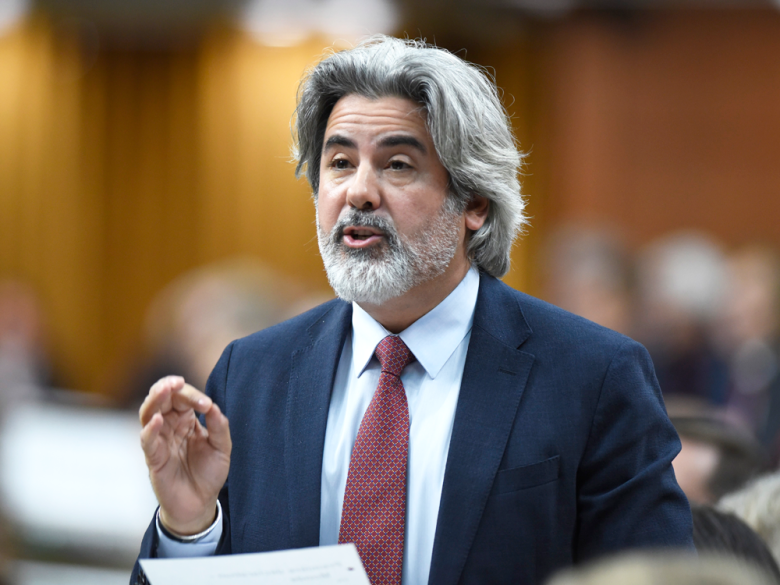The federal government has released a new anti-racism strategy that promises $45 million to fight systemic discrimination through community programs, public education campaigns and combating online hate.
The three-year strategy, unveiled in Toronto on Tuesday by Heritage Minister Pablo Rodriguez, fulfils key recommendations from a parliamentary committee study that arose from a controversial anti-Islamophobia motion, M-103, which concluded last year.
The new plan, first announced in Budget 2019, includes a definition of Islamophobia taken from the Ontario Human Rights Commission, but otherwise seldom names individual minority groups that are frequent targets of discrimination, instead referring more broadly to “racialized communities” and “religious minorities.”
“While we take pride in being a welcoming and inclusive country, we know that racism and discrimination are still a reality for many Canadians across the country,” Rodriguez said in a statement. “This national anti-racism strategy is an essential first step in building a more inclusive country, where all Canadians can participate equally.”
The strategy promises $4.6 million to establish an anti-racism secretariat within the federal Heritage department that would “lead a whole-of-government approach in addressing racism” and would report publicly on its results.
It commits another $30 million to community-based projects focused on reducing barriers to employment and participation in sport, arts and culture. It promises further investments in a national awareness campaign and to improve data collection regarding racism and discrimination.
The government is also pledging $5 million for civic literacy programs that “address online disinformation and hate speech.” The document points out that Canada joined the Christchurch Call to Action, a pledge to fight violent extremism online, following the March shootings at two mosques in Christchurch, New Zealand.
The government’s anti-racism strategy comes more than a year after the House of Commons heritage committee released the results of its study of systemic racism and religious discrimination, born of the Liberals’ controversial anti-Islamophobia motion, M-103, which called on the government to condemn Islamophobia and all forms of racism. Though M-103 was a motion, not a piece of legislation, and thus did not create any new laws, it ignited a political firestorm, with Conservatives arguing it would stifle free speech as, they claimed, the term Islamophobia was poorly defined.
Ultimately, the heritage committee recommended the government update its national action plan against racism and create a directorate to implement the plan — recommendations Ottawa has now fulfilled.
This national anti-racism strategy is an essential first step in building a more inclusive country
The federal government has also chosen a definition of Islamophobia. It defines Islamophobia as “Includ(ing) racism, stereotypes, prejudice, fear or acts of hostility directed towards individual Muslims or followers of Islam in general. In addition to individual acts of intolerance and racial profiling, Islamophobia can lead to viewing and treating Muslims as a greater security threat on an institutional, systemic and societal level.”
The definition is the same as the one used by the Ontario government in its own anti-racism plan, released in 2017 by the former Liberal government. But while the Ontario plan includes a section on the “urgent” need to target Islamophobia, with specific commitments, the federal plan takes a broader approach, rarely making explicit reference to Islamophobia.
Jasmin Zine, a professor of sociology and Muslim studies at Wilfrid Laurier University, said she’s disappointed the document “barely acknowledges” Islamophobia, noting it only once references the 2017 shooting at a mosque in Quebec City that left six men dead. “The lack of political will to address or even acknowledge Islamophobia is an affront to those who were murdered in the QC massacre in an act of terror inspired by white nationalism as well as to all Canadian Muslims,” Zine said in an email.
Though the document names individual groups infrequently, it does include a section on discrimination against Indigenous peoples. It says the government is working to implement the recommendations of the Truth and Reconciliation Commission and is developing an action plan to respond to the final report of the national inquiry into missing and murdered Indigenous women.
The federal government’s definition of anti-Semitism is taken from the International Holocaust Remembrance Alliance, which defines it as “a certain perception of Jews, which may be expressed as hatred toward Jews. Rhetorical and physical manifestations of anti-Semitism are directed toward Jewish or non-Jewish individuals and/or their property, toward Jewish community institutions and religious facilities.”
The anti-racism strategy was developed following 22 consultation sessions between October 2018 and March 2019, where the government heard from about 600 people.


























